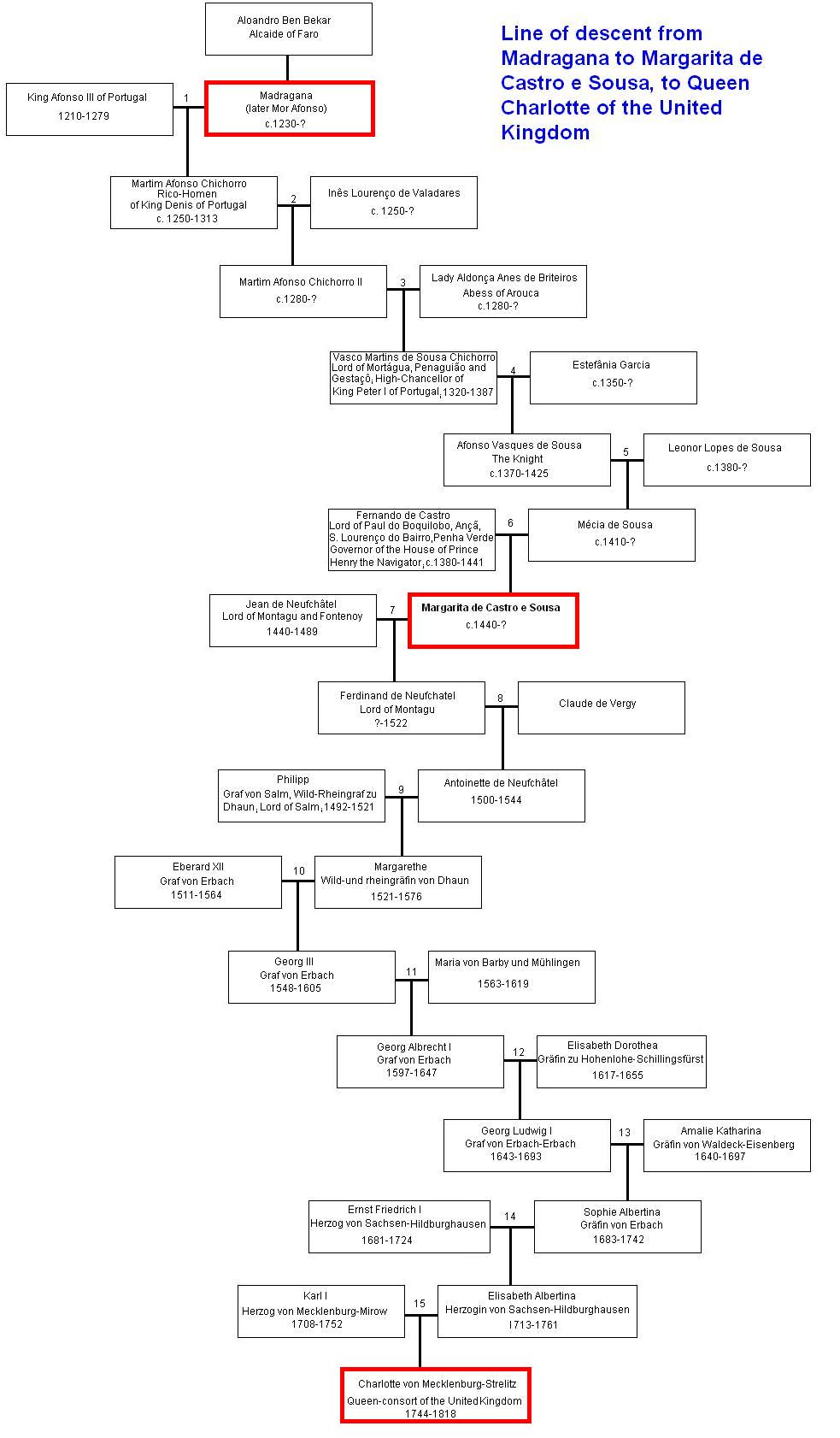Madragana on:
[Wikipedia]
[Google]
[Amazon]
Madragana Ben Aloandro, later Maior or Mór Afonso (born c. 1230, Faro,
 There is some controversy regarding her ethnicity. Duarte Nunes de Leão, a Portuguese royal chronicler of the 16th century, said that Madragana was a Moor. That was disputed in the 18th century by António Caetano de Sousa. She was probably Mozarab. Nonetheless, this supposed Moorish connection gave rise to a claim by Mario de Valdes y Cocom that the British royal family had African ancestry via the 15-generation descent of
There is some controversy regarding her ethnicity. Duarte Nunes de Leão, a Portuguese royal chronicler of the 16th century, said that Madragana was a Moor. That was disputed in the 18th century by António Caetano de Sousa. She was probably Mozarab. Nonetheless, this supposed Moorish connection gave rise to a claim by Mario de Valdes y Cocom that the British royal family had African ancestry via the 15-generation descent of
"The blurred racial lines of famous families - Queen Charlotte"
PBS Frontline. However, it is far from clear that Madragana's family was of recent African origin, nor is it likely that, even were she African, Madragana's negligible contribution to Charlotte's genetic makeup would have caused the Queen alone, among all of Madgarana's descendants at this number of generations' removed, to display distinctive African features.Stuart Jeffries, "Was this Britain's first black queen?"
''The Guardian'', 12 March 2009. Madragana bore Afonso two known children: *'' Martim Afonso Chichorro'' (c. 1250 – after 1313), married to Inês Lourenço de Sousa (or Inês Lourenço de Valadares) (born c. 1250). *''Urraca Afonso'' (born c. 1260), married twice: 1st in 1265 to Pedro Anes Gago de Riba Vizela (c. 1240–1286); 2nd c. 1275 to João Mendes de Briteiros (born c. 1250). When passion with the King waned, Madragana was married to ''Fernão Rei''. They had at least one daughter, ''Sancha Fernandes''. Note that ''Rei'' means 'king', in
Algarve
The Algarve (, , ; from ) is the southernmost NUTS II region of continental Portugal. It has an area of with 467,495 permanent inhabitants and incorporates 16 municipalities ( ''concelhos'' or ''municípios'' in Portuguese).
The region has it ...
, Portugal), was a woman from the Algarve known as a mistress
Mistress is the feminine form of the English word "master" (''master'' + ''-ess'') and may refer to:
Romance and relationships
* Mistress (lover), a term for a woman who is in a sexual and romantic relationship with a man who is married to a ...
to king Afonso III of Portugal
Afonso III (; rare English alternatives: ''Alphonzo'' or ''Alphonse''), or ''Affonso'' (Archaic Portuguese), ''Alfonso'' or ''Alphonso'' ( Portuguese-Galician) or ''Alphonsus'' (Latin), the Boulonnais ( Port. ''o Bolonhês''), King of Portugal ...
, in the 13th century, when he ended the Reconquista
The ' (Spanish, Portuguese and Galician for "reconquest") is a historiographical construction describing the 781-year period in the history of the Iberian Peninsula between the Umayyad conquest of Hispania in 711 and the fall of the Nasrid ...
in Portugal by taking Faro in 1249. Faro was at that time the last part of the Kingdom of the Algarve still in Muslim hands, and there her father was the Qadi
A qāḍī ( ar, قاضي, Qāḍī; otherwise transliterated as qazi, cadi, kadi, or kazi) is the magistrate or judge of a '' sharīʿa'' court, who also exercises extrajudicial functions such as mediation, guardianship over orphans and mino ...
.
Christening
She was christened in time, receiving her new name as ''Maior Afonso'', or ''Mor Afonso'', Mor being short for Maior, a common female name in medieval Portuguese. Afonso was given her in baptism as her new patronymic, meaning "the daughter of" Afonso - and that suggests that her elderly royal lover was also her godfather, that she took his spiritual "fatherhood" when christened. Her father's name was Aloandro Ben Bekar (also known in Portuguese as ''Aloandro'' or ''Aldroando Gil'' after his christening). In ancient Portuguese chronicles, ''Madragana'' was also referred to as ''Mouroana'', ''Mouroana Gil,'' and ''Madraganil'' - all of which are Christian names.Ethnicity
Charlotte of Mecklenburg-Strelitz
Charlotte of Mecklenburg-Strelitz (Sophia Charlotte; 19 May 1744 – 17 November 1818) was Queen of Great Britain and of Ireland as the wife of King George III from their marriage on 8 September 1761 until the union of the two kingdoms ...
, wife of George III of the United Kingdom, from Madragana, giving Charlotte what the proponent described as a "conspicuously Negroid" appearance.Mario de Valdes y Cocom"The blurred racial lines of famous families - Queen Charlotte"
PBS Frontline. However, it is far from clear that Madragana's family was of recent African origin, nor is it likely that, even were she African, Madragana's negligible contribution to Charlotte's genetic makeup would have caused the Queen alone, among all of Madgarana's descendants at this number of generations' removed, to display distinctive African features.Stuart Jeffries, "Was this Britain's first black queen?"
''The Guardian'', 12 March 2009. Madragana bore Afonso two known children: *'' Martim Afonso Chichorro'' (c. 1250 – after 1313), married to Inês Lourenço de Sousa (or Inês Lourenço de Valadares) (born c. 1250). *''Urraca Afonso'' (born c. 1260), married twice: 1st in 1265 to Pedro Anes Gago de Riba Vizela (c. 1240–1286); 2nd c. 1275 to João Mendes de Briteiros (born c. 1250). When passion with the King waned, Madragana was married to ''Fernão Rei''. They had at least one daughter, ''Sancha Fernandes''. Note that ''Rei'' means 'king', in
Portuguese
Portuguese may refer to:
* anything of, from, or related to the country and nation of Portugal
** Portuguese cuisine, traditional foods
** Portuguese language, a Romance language
*** Portuguese dialects, variants of the Portuguese language
** Portu ...
, and so ''Fernão Rei'' is believed to originally have been a servant of the king (''Fernão do Rei'', Ferdinand of the King).
References
{{Reflist Mistresses of Portuguese royalty Portuguese nobility 1230s births Year of death unknown People from Faro, Portugal 13th-century Portuguese people 13th-century women